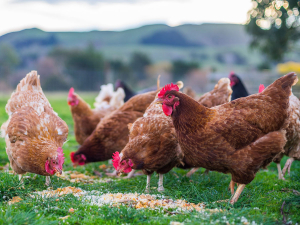Queensland Fruit Fly Movement Controls Lifted in Mt Roskill
Controls on the movement of fruit and vegetables in the Auckland suburb of Mt Roskill have been lifted.
 Test results to date from a small free-range layer chicken farm near Dunedin are negative for avian influenza.
Test results to date from a small free-range layer chicken farm near Dunedin are negative for avian influenza.
Biosecurity New Zealand says test results to date from a small free-range layer chicken farm near Dunedin are negative for avian influenza.
On Tuesday, Biosecurity New Zealand put a precautionary restricted place notice on the Dunedin farm, stopping movement of material on and off the property, after some of its 6,000 birds died.
Biosecurity New Zealand deputy director-general Stuart Anderson says numerous samples from the Dunedin farm have been tested and if bird flu were present, it would have been found by now.
“The results will be welcome news for the farmer and we would like to acknowledge their efforts in reporting the deaths and working with our staff,” Anderson says.
“At this stage, we believe the issues on the farm are caused by an existing New Zealand disease among the birds and we will work with the farm to identify what it is and provide support.”
The precautionary biosecurity controls put on the property on Tuesday will remain in place for now while more testing is carried out to determine the cause of illness.
Meanwhile, testing and monitoring continue to show no signs of disease on five chicken farms operated by Mainland Poultry and linked to its Hillgrove, Otago, site which tested positive for the H7N6 subtype of avian influenza last weekend.
The depopulation of chickens on two infected sheds at the Hillgrove property continues today.
“Steady progress is being made to depopulate chickens in two sheds at the Hillgrove egg farm and dispose of them safely at a secure landfill designed for such purposes,” Anderson says.
He says there have been no signs of production or ill birds at Mainland Poultry’s five other properties in the area.
“The Ministry for Primary Industries’ enhanced PC3 laboratory at Wallaceville in Wellington continues to steadily work through hundreds of samples at a time and it’s good news that we’ve not found any other infection yet,” he says.
“We’ve moved quickly in the past week to put in restrictions, investigate, track, and test, and I thank the farmers involved and our industry partners for their help – together we’ve made strong progress.”
Testing will continue throughout the disease’s three to 21 day incubation period.
Teams are also on-the-ground visiting properties within Biosecurity New Zealand’s 10-kilometre enhanced surveillance zone around Hillgrove, with support from the regional control centre set up to help response efforts.
“Our staff are visiting landowners that own poultry, including commercial and back yard, to provide helpful information on best biosecurity practices, signs of HPAI to look out for, and how to report these to MPI’s pest and disease hotline,” Anderson says.
“We remain confident that we are on the right track to stamping out H7N6.”
The Meat Industry Association of New Zealand (MIA) today announced that Chief Executive Officer Sirma Karapeeva has resigned from the role.
The winners of the 2026 Hawke’s Bay/Wairarapa Dairy Industry Awards were announced at the annual awards dinner held at Copthorne Solway Park in Masterton on Thursday evening.
Environment Southland is welcoming this week’s decision by the Environmental Protection Authority (EPA) to approve the release of Blaptea elguetai, a leaf‑feeding beetle that will help control the highly invasive Chilean flame creeper.
This March, the potato industry is proudly celebrating International Women’s Day on 8 March alongside the International Year of the Woman Farmer, recognising the vital role women play across every part of the sector — from paddocks and packhouses to research, leadership, and innovation.
Fruit trader Seeka posted a record profit and returns to shareholders in 2025.
Recent weather events in the Bay of Plenty, Gisborne/Tairawhiti, and Canterbury have been declared a medium-scale adverse event.

OPINION: A mate of yours truly reckons rural Manawatu families are the latest to suffer under what he calls the…
OPINION: If old Winston Peters thinks building trade relations with new nations, such as India, isn't a necessary investment in…